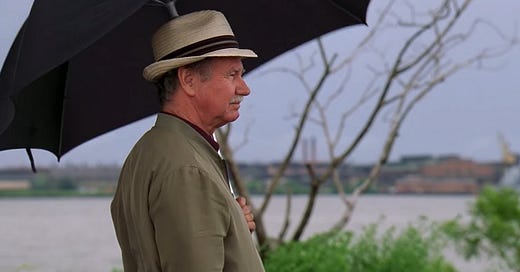
Dear Reader,
In 1999, I attended a literary event at an NYC Barnes & Noble—I can’t remember which one, or if that location still exists—and heard Claire Messud read from her second novel, The Last Life. I was not there to see Claire Messud. I was there to see Bret Easton Ellis, who was reading from his new novel, Glamorama—in what was, ironically given the book’s title, arguably the least glamorous bookstore in Manhattan. Messud was the opening act, Ellis the headliner.
As we took our seats in the ad hoc reading area in the middle of the stacks—there weren’t as many people there as I thought there would be—I scanned the floor for the celebrated author of Less Than Zero and American Psycho. No sign of him. When Ellis finally appeared, he was wearing a sweater vest over a shirt and tie and dress slacks—fastidiously groomed, preppy, like one of his characters. He radiated the undeniable glow of celebrity. He read from the book in a dull monotone. He did not banter with the audience. He did not take questions. When he finished, he vanished as quickly as he’d appeared. Is that, I wondered, how the darlings of subversive Gen X literary fiction are supposed to behave?
Messud, on the other hand, was luminous. She engaged with the audience. She read with emotion and inflection. She didn’t seem put out to be there. The excerpt she read was very good, in the manner of top-shelf literary fiction, as was The Last Life. She made such a favorable impression on me that when I came across her subsequent book, The Hunters, two years later at St. Mark’s Bookstore, I immediately bought it.
The Hunters consists of two novellas: “A Simple Tale” and “The Hunters.” The former is a solid effort. The latter, eponymous novella is an unqualified masterpiece: one of my all-time favorite works of fiction, a work I revisit over and over again—something I had on the syllabus when I taught creative writing a decade and a half ago. Messud’s debut, When the World Was Steady, was nominated for the PEN-Faulkner Award. The book she published right after The Hunters, The Emperor’s Children, was a New York Times bestseller and longlisted for the Man Booker Prize; that’s probably what she’s best known for. But I’m telling you, “The Hunters,” while less heralded, is her magnum opus. As a piece of writing, it is astonishingly, enviably good. No less an authority than the New York Times calls it “a work of near-miraculous perfection,” and I couldn’t agree more. There’s not a single word that I would change.
“The Hunters” is written in the first person. Our narrator is an American academic, a social scientist whose specialty is the history of death, who has holed up for the summer in London—or, rather, and as we quickly find out, in less-than-desirable Kilburn—to do research for a new book (publish on, rather than or, perish). We know next to nothing about this person. We do not have a name, an age, a physical description, a sexual orientation, a U.S. state of origin, a university affiliation, a religion. We do not even have a gender.
The first time I read the book, I assumed that the narrator was a woman, because Claire Messud is a woman; I was a good quarter of the way through before I realized that I didn’t know—we never actually find out for sure—and was surprised at how uneasy this made me. This is one of the book’s subtle but masterful achievements, how and why this information is withheld from the reader. The polarity of gender in “The Hunters” is cloudy and indeterminate, as are other polarities established throughout the book: home and away, gay and straight, fashionable London and not, young and old, sexually active and celibate, and, most significantly, dead and alive. Not knowing the gender of the narrator—and the reader’s sudden realization that we don’t know a piece of information that is one of the first things we subconsciously make note of about another human when we initially meet them—disorients the reader, intentionally. This, incidentally, is the sort of writerly trick that only works in book form; you can’t pull that off in a movie or a TV show. (It’s also a fun exercise, in class, to ask students to make the argument one way or the other, and provide textual evidence to support the position).
What we do know is that our nameless narrator is smart, elegant, misanthropic, haughty, and insecure; writes beautifully if a bit formally; is something of a snob and fastidious about food and wine (and is a legendarily good cook); and has just broken up with a serious significant other—a person who was originally intended to be a companion for the summer of academic research in London—and is in a precarious state of mind.
At first, things are great. The isolation is salubrious. The work is going well. The narrator’s mental health is in a good place:
I was sad, yes, I was on one level of my being, to be frank, almost suicidal (and unable to shake the preoccupation that I would die before my research was done, before my book was written), and at the same time, on another, I was blissful. I was happier than I had ever been, since early childhood. This made me think several things: one was that I had achieved a doglike state, that like an animal I was leading an unquestioning life, and that therein lay my pleasure. It was finite: I was in London only for the summer, after which I would return home. It was purposeful, or no more futile, at least, than any other time of my life, of any life. I was unencumbered. And this, this this very unreflective euphoria which seemed to betoken an animal state, seemed also divine. I did feel God-like. I felt that I looked upon the mortals around me as from a great height. I observed anxiety or rage or hope in the faces of my fellows with a salutary flood of compassion; but it was as if their experience of life, so emotion-filled, so wearing, mired in the infinite, pointless encumberedness of their days, were completely other than mine. And my freedom from emotion, paradoxically, made me feel more rather than less alive; it made me feel, too, that they, all those who felt, were merely distracted by their feelings and were far less alive than I. I felt at once, and palindromically, like a dog and a god, and these were not contradictory experiences.
As both a fan of good writing, and as a writer always striving to string together words and sentences and ideas as perfectly as possible, I blow chef’s kisses at that gorgeous paragraph. The word choices, the frequent pauses, the staccato rhythm of the sentences—long then short—the simple yet complex mirroring of dog and god: it takes my breath away. (It’s also particularly fascinating to read it now, 20 years after it was written, subsequent to our collective experiences in quarantine.)
From the rented flat, the narrator can look into the windows of the surrounding apartment buildings. There is a Rear Window quality to the experience. Our academic is studying the neighbors as if they are reanimated Londoners from the 19th century, data points in the academic deep dive on death. And then one of those neighbors comes along and shatters the fourth wall, piercing the bubble, destroying the reverie.
Her name—and what a name!—is Ridley Wandor, and she lives with her infirm mother in the flat downstairs. Ridley hits the buzzer—“a brutal and invasive ringing”—announcing herself as loudly as possible, and is let into the narrator’s flat. Our academic immediately and viscerally despises her:
Perhaps because my intensive solitude had so neutralized my own emotional range, I found, in those weeks, that the emotional states of others emanated from them in waves, as powerfully as any scent. I could sense this on the buses, when breathless women flopped in beside me, in eagerness or fear; when men jittered their limbs in the bank queues, I could derive the manifold sources of their malaise; even teenagers, with their flouncing mannerisms and cardboard confidence, were laid bare to me at a glance, or a sniff. And Ridley Wandor, no teenager, was no exception, gave off the pewter tang of misery and the musk of menace. Oh, not to forget: and need. Acidic, brown. I can detect it even now as a recollected burning in my sinuses: the particular flavor of Ridley Iris Wandor.
This desperately friendly newcomer knows all the basic information about the narrator that we do not: name, age, physical appearance, gender, sexual orientation probably.
Ridley is an elder care nurse. And after a string of patients die quickly, almost immediately upon her arrival at each new posting, she becomes convinced that she, somehow, through some quirk of metaphysics, is responsible for these deaths. What starts off as Rear Window becomes something darker, eerier, its dread more existential. What power lies in intention? And can that power be wielded for nefarious purposes, accidentally or otherwise? The narrator—and Messud—takes that idea and runs with it:
The other eventuality, the supernatural, which might on one level have seemed still more outlandish, seemed yet somehow easier to accept: that [Ridley] was not veiling her truth, but rather telling it, to the best of her ability; that she did wish her patients dead, and that they did, subsequently, die; just as I, by thinking so long upon it, had wished intrigue into the flat below, only to have it climb the stairs and visit me, ostensibly uninvited, but in fact willed, willed for weeks. I had wanted to know what was going on, and now I knew. She had wanted those patients to die, and now they had.
I could keep quoting “The Hunters” until I type the entire manuscript onto these pages, giving myself chills at the exquisiteness of the prose as I go, but I’m not legally allowed to do that—and, anyway, I don’t want to spoil it further. It is a story about intention and wish fulfillment, about hopes and dreams, about isolation and community, about loneliness and friendship, and death and life, about how the most beautiful things can happen, and the most dismal, because of as simple a choice as which flat to let in London. You could read it in an afternoon.
Every time I read “The Hunters,” I feel it all: the irritation brought on by other people, even other people I love. The desire to flee to some faraway city and isolate myself. The stranger-in-a-strange-land pleasure of existing in a place where there is no chance, none, that I will bump into someone I know. And, conversely: the foreknowledge that, were I to achieve that level of social detachment, the splendid isolation enjoyed for a short spell by our nameless narrator, I would immediately feel lonely and insecure, and all I would want to do is touch base and come home. How does Holden Caulfield put it at the end of The Catcher in the Rye? “Don’t tell anybody anything. If you do, you start missing everybody.”
The narrator winds up holding a rather cynical view on the power of intention—or, rather, of wish fulfillment:
Be careful what you wish for. The moral of children’s fairy tales is true. I didn’t wish for the person who changed my life—I couldn’t have, not in that guise. My life as it is now, benison and balm, is something I cannot wish even today to keep.
I love that: benison and balm. The sentiment, the old-timey word choice, the alliteration, the simple beauty of the pairing. So I will heed that fairy-tale warning, Dear Reader, and take great care in making my wish, which is: benison and balm for you, for me, for the country, for the world, for the very planet. We need those things—and nothing more.
ICYMI
Friday night was the season premiere of The Five 8—four seasons, one for each indictment! Chunk did a whole new opening sequence that is lights out. Our guest was the rhetorician and author Jen Mercieca:
And the karaoke is a Taylor Swift parody:
Photo credit: Irina Balashova. Rabbits in cages. IYKYK.
















A little intrigued here. But I'm ashamed to say, I'd never heard the word, " benison" before. Didn't have a dictionary handy, so when I looked up the definition in Google, it sought out the word " venison" repeatedly. One has to s l o w l y spell it out. ( To acquire the state of venison, that is no "blessing" to the deer. ) I tend to write only poetry (unpublished), as my feeble attempts to write prose tend to frustrate me. Now poems, I have awoken from a dream, with the sound of the Winter Park train in the background at midnight; the first few lines of a poem on my lips.. " The Southwest train blew deep into the belly of the night..." Thank you for today. You piqued my interest.
Wow. Thank you for sharing. I know the next book I will read.